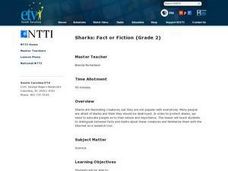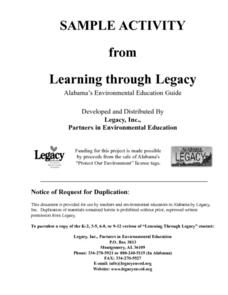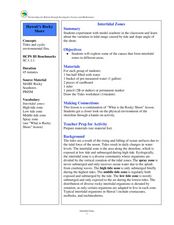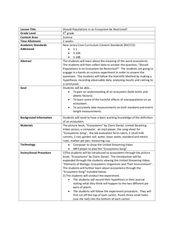Curated OER
Osmosis
Fifth graders explore osmosis as they watch organisms divide. In this organism lesson, 5th graders use potatoes to experiment with the effects of salty water in the body. Students discuss what osmosis is and record what...
Curated OER
Sharks: Fact or Fiction
Second graders discover the truth about sharks. In this shark lesson, 2nd graders use different resources to help distinguish between fact and fiction with what they have heard about sharks. They complete an attached activity sheet.
Curated OER
A Day In My Life
Students brainstorm how they can conserve energy in their daily lives. For this energy lesson plan, students discuss how they use energy and ways to conserve it.
Curated OER
Gotta Have Energy
Students explore energy. They discuss the types and uses of energy and research an assigned energy source. They create a "benefits versus potential environmental impacts" chart that lists energy sources and possible impacts. They...
Curated OER
Water and Rice Agriculture
Second graders investigate the agriculture of rice by reading a study guide. In this food making lesson, 2nd graders read about the irrigation of rice fields used for harvesting. Students write three sentences about the rice...
Curated OER
SKIN CARE: ACNE
Students study the underlying causes, prevention, and treatment of acne.
Curated OER
Tornadoes
Students examine the characteristics of a tornado. They practice using new vocabulary and participate in a question and answer session. They use the internet to gather more specific information.
Curated OER
Marine & Aquatic Habitats Activities - Terrestrial Forests vs. Kelp Forests
Students discuss concept and specificity of habitats, both marine and terrestrial, list similarities and differences in the habitats of a kelp forest and a terrestrial forest, compare types of organisms that occupy corresponding types of...
Curated OER
Using Vegetation, Precipitation, and Surface Temperature to Study Climate Zones
Students begin their examination of the climate zones found around the world. Using a software program, they identify the relationship between the vegetation, climate and temperatures of the different zones. They also plot coordinates...
Curated OER
Model Rockets
Students build a model rocket. In this model rocket lesson plan, students explore a rocket launch cycle. Students investigate the laws of physics for each part of the launch. Students build model rockets and launch at school.
Curated OER
Acid Rain in our State
Students conduct internet research on acid rain, a serious environmental problem. They examine the pH levels of rainwater for their state, collect data from their community and investigate the causes and solutions for acid rain.
Curated OER
Letting Off Steam
Students examine the concept of transpiration. They work together to complete an experiment in which they see water loss in plants. They record their observations and discuss their conclusions.
Curated OER
Animal Alphabet
Second graders identify animals with each letter of the alphabet. In groups, they create a PowerPoint presentation which shows the information they have collected about each one. Using all of this information, they create an animal...
Curated OER
Newspaper Articles
Seventh graders summarize a newspaper article. In this writing lesson students choose a newspaper article about an environmental issue. The students summarize the article and devise a solution to the environmental issue.
Curated OER
Intertidal Zones
Students explore intertidal zones. In this intertidal zones lesson plan, students work in small groups and use ready-made materials to create a model of intertidal zones. Resources are provided.
Curated OER
Brine Shrimp Hatching Experiment
Students hatch brine shrimp in a classroom experiment. In this hatching brine shrimp lesson, students participate in two-week lab in which they study how brine shrimp hatch under different conditions. They record data about the control...
Curated OER
Acids and Bases: Together again!
Students identify principles behind acid-base reactions. They predict factors that may affect an acid-base reaction. Students identify questions and concepts that guide scientific investigations.
Curated OER
Should Populations in an Ecosystem be Restricted?
Fourth graders experiment to determine how overpopulation effects ecosystems specifically plants. In this ecosystem instructional activity, 4th graders conduct an ecosystems experiment after listening to Claire Daniel's, Ecosystems. They...
Curated OER
A Day on the Farm
First graders, with a collection of various art supplies, plant a seed to observe it growing and record specific data on a data record sheet. They create a collage from various magazines of ten different foods farm animals eat and make a...
Curated OER
Keeping Warm When it is Cold: How does a polar bear keep warm?
Students make a model of a polar bear and discuss why fur/skin color is important. They also perform a simple experiment using black and white socks to determine how color affects temperature.
Curated OER
Reflections on Earth: Exploring Planet Earth from Space
Students examine satellite images of Earth and contrast images at different scales. In this exploring Earth from space lesson plan, students use satellite images to contrast images at different scales, calculate distances from the scale...
Curated OER
Vermicomposting
First graders investigate composting. In this biology lesson plan, 1st graders identify ways to use garbage as fertilizer. Students examine soil and compost matter as well as the role of worms in the dirt.
Curated OER
You Can Die Here
Students examine Death Valley including the amount of precipitation and winds that it gets. For this climate based lesson students explain the reasons for the amount of precipitation and windward patterns in Death Valley.
Curated OER
Ice Energy
Students observe the chemical reaction that occurs when salt is put on ice, and use the energy that is released to make ice cream.























